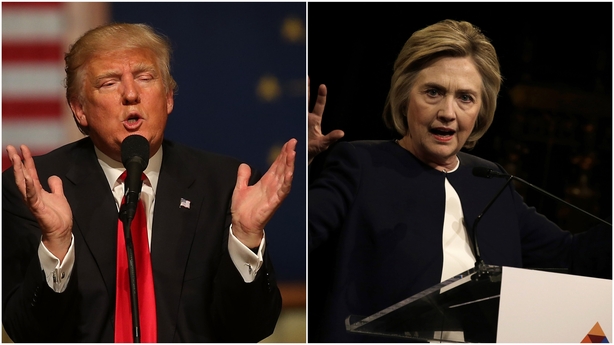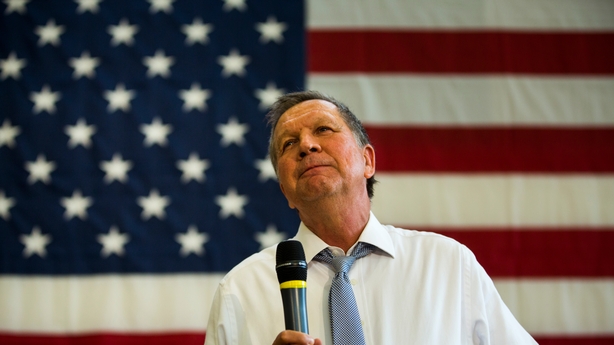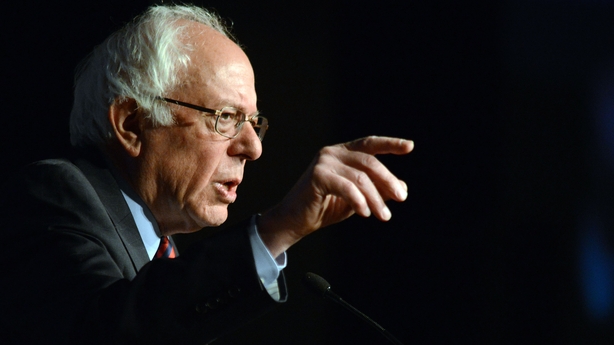It was another dramatic night in the US Presidential Primary elections with the announcement from Ted Cruz that he was dropping out of the race.
After a resounding victory in Indiana, Donald Trump is now the Republican Party's presumptive nominee.
In the Democratic Party, Bernie Sanders beat the opinion polls once again to beat Hillary Clinton.
RTÉ's Washington Correspondent Caitríona Perry discusses just how surprising the 2016 Race for the White House continues to be.

Ted Cruz is out. What happened? Was this expected?
We have said it time and again here - nothing is inevitable in this election cycle.
If last June anyone had said Donald Trump would be the Republican Party's presumptive nominee and he would get to that position before Hillary Clinton is declared the Democratic nominee, nobody would believe it.
He has pulled off a stunning feat. At one time there were 17 candidates in this field; governors such as Chris Christie, Scott Walker, Jeb Bush; senators such as Rand Paul, Rick Santorum, Lindsey Graham; the great future hope label given to Marco Rubio; and Donald Trump.
The Republican voters have seen them all off. It was unexpected in the first place that Ted Cruz would have been his closest rival and now he too is gone.
Mr Cruz had marked traditionally conservative Indiana out as a firewall against Mr Trump, because he was likely to win in some other big upcoming states such as New Jersey and West Virginia.
Mr Cruz needed to win to keep the race alive to get him to the big delegate state of California. Losing it as dramatically as he did was an indicator of the limited road ahead.
However it is still a surprise that he dropped out last night. He would have been expected to stay in another few weeks, especially given the nasty exchange yesterday over the completely unsubstantiated allegations that Mr Cruz's father had an involvement with the JFK assassination.
What happens now? Donald Trump is essentially the presumptive nominee - is his path clear?
Mr Trump is the presumptive nominee - labelled so by the chairman of the Republican national committee Reince Priebus last night.
However, Mr Trump still needs to get the simple majority of delegates who will vote at the convention to pick the party's nominee to go forward into that head-to-head contest with a Democrat.
Given that he is less than 200 delegates short of the 1,237 he needs to win, and he is likely to win many if not all of the upcoming states, he should get there.
All will be decided in the California primary on 7 June.
If Mr Trump does not reach the number by then, there will be a contested convention but it is unlikely that anyone other than Trump would be put forward.
He himself has already moved onto the 8 November election and a focus on Hillary Clinton.

When he delivered his victory speech last night he was much more subdued and controlled - more statesmanlike.
It was as if he was showing Republicans who are uncertain of him that he can tone it down and represent the United States and the party in a more traditional way.
There were no chants of "build a wall", but rather mention of getting jobs for the Hispanic community and everyone.
The focus of his speech was job creation, improving the economy, beating Hillary Clinton and praising Ted Cruz - that was done expressly with the intent of trying to create party unity.
But of course he is not the only man left in the party, Ohio Governor John Kasich is still in there.
Yes and he is coming fourth in a two-man race as both Mr Cruz and Mr Rubio have more delegates than he does, even though they have now both dropped out.
Nevertheless if Mr Kasich has enough money and support there is nothing to lose by staying there and possibly everything to gain.

Again he would hope that if Mr Trump does not get a simple majority by the convention and it goes to open floor voting, he says that he has a number of Trump delegates that will support him.
He also polls much better than Mr Trump when it comes to the Republican candidate that can actually beat Hillary Clinton in the election in November.
He says he can "unite the party better than anyone else. Trump's cynical sowing of division will render the GOP into angry, irrelevant status for decades".
The Democratic race played second fiddle last night to the drama of the Republican Party, but nevertheless a big victory for Bernie Sanders.
Texan Senator Ted Cruz and the Republicans somewhat stole Bernie Sanders thunder last night. But the Independent Senator from Vermont who is running for the Democratic Party did record another victory - his 18th of this primary and caucus season.

Mr Sanders beat Mrs Clinton by around five percentage points but under the Democratic rules of proportionality - whereby they share all of the delegates on offer in a state - he did not actually make that big of a dent in her lead.
Speaking late last night, Senator Sanders pledged to keep the contest going, saying that he had the "enthusiasm, excitement and voter turnout that this party needed to beat Donald Trump".
He acknowledged that any chance of clinching the nomination would be an uphill struggle, but that he did see a "path to victory" nonetheless.
In terms of pledged delegates, it is possible for Mr Sanders to beat Mrs Clinton. Albeit highly improbable, he would need to win all of the remaining contests by greater margins that he did last night.
Mrs Clinton still has more than 500 superdelegates - elected officials not tied down in their vote - who have said they will vote for her.
Senator Sanders has said that he would hope to persuade some of those to vote for him if he keeps winning. So he is not giving up but at this stage it is almost certainly a Trump v Clinton election battle.
But in this election cycle, it has been proven time and again that anything can happen.
Where to next?
The US territory of Guam holds a Democratic caucus on Saturday, then on Tuesday it is the West Virginia primary for both parties and the Republicans of Nebraska will hold their primary election too.
